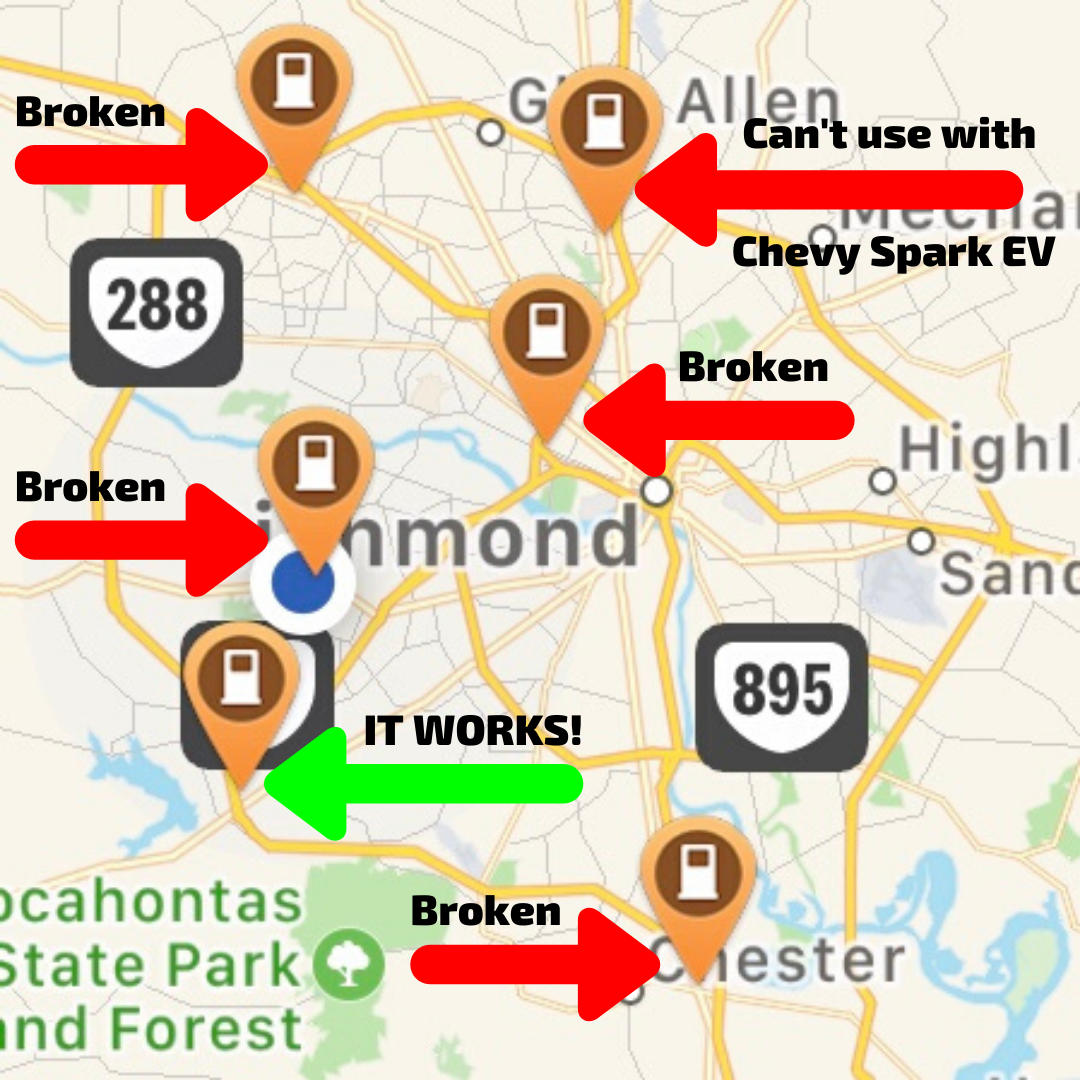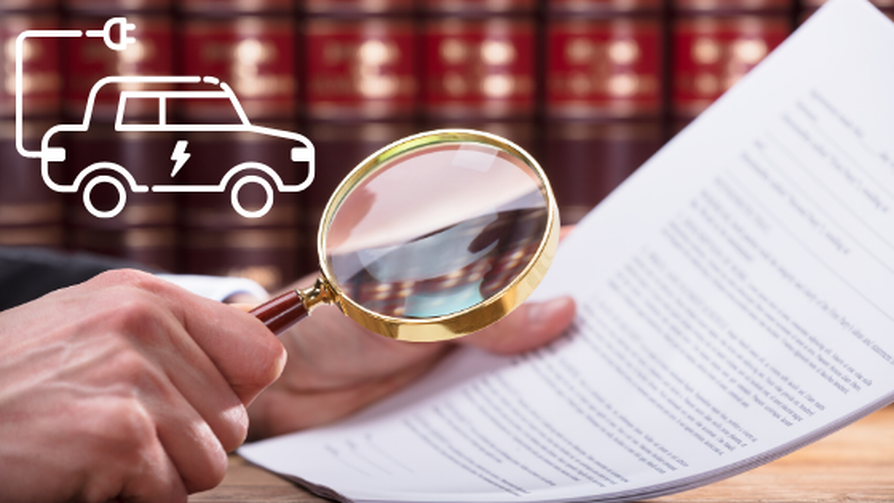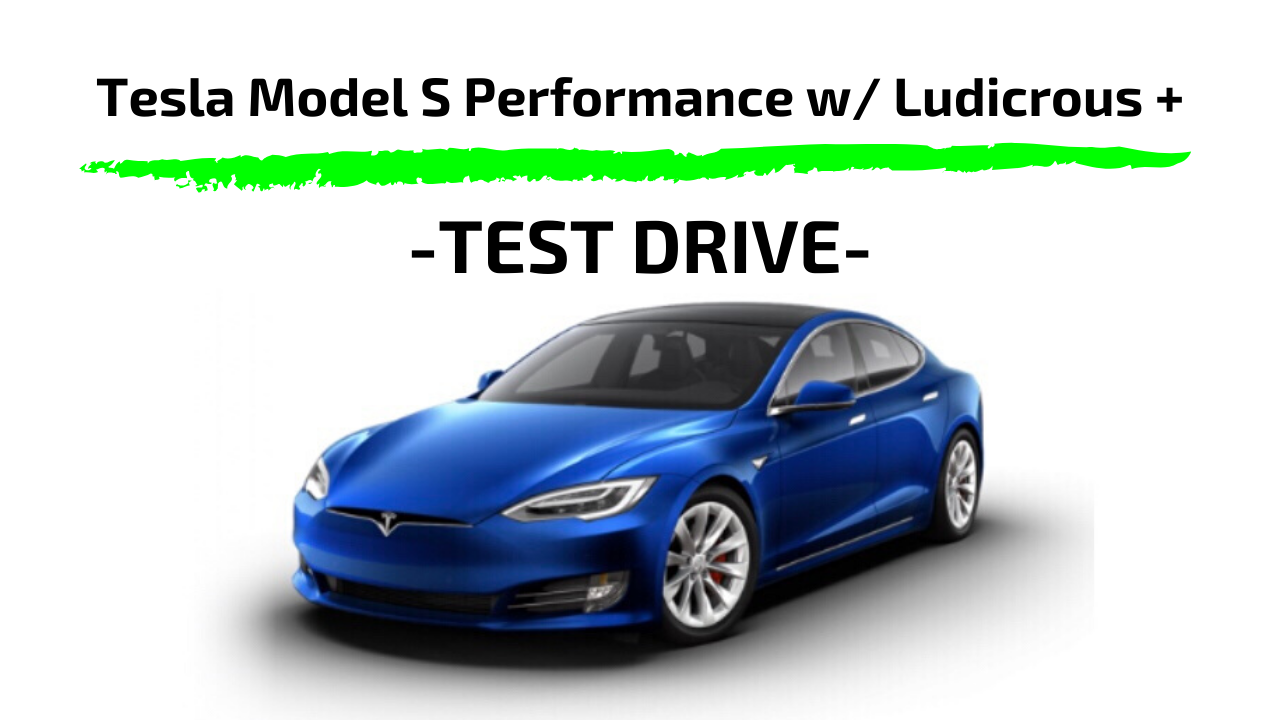|
By Zack Hurst, 2016 Chevy Spark EV The state of the charging infrastructure isn't getting better... it's getting worse.
Then today happened.With 8 miles of range left, I headed for a reliable DCFC closest to me that I last used a couple of days ago. Plugged in, and... nothing. It didn’t even recognize that I was plugged in. Crap. Ok, fine. Time to go to the only other conveniently located DCFC and use that one. However, it was 16mi away and I wouldn't be able to get there without using a LVL2 Charger in between. I get there, and there are plug-in hybrids in every stall, plugged in. Ok... off to the next LVL2. Now I have 2mi left.
Charged at 3.3kW (the max for the Chevy Spark EV) until I had enough range to get to the other working DCFC I use regularly. I pulled up to see an electrician parked in the spot. I kindly asked if I could use the parking space to charge. “You’re not going to be able to do that, the charger is being serviced right now.” I had very little range left, but was able to plug into a wall outlet and use 110v (slowest way to charge) to get enough to go to the next closest DCFC. Which... worked! So I'm plugged in and charging while writing this. And while relieved, I find that I'm VERY frustrated with this experience. Granted, most people wouldn't have this kind of problem... why? Well, most people don't drive more than 120mi in a day (on average) with a car that has a 82mi EPA rated range. Most people don't drive more than 40mi a day. So I definitely have the WRONG CAR for my driving habits, but I still feel like there should be something done about the failing infrastructure in the area. Many of the broken DCFC have been down for months, or even more than a year. When this happens, where else can we go to get these precious electrons in a timely manner? While EV Resource is planning on building out the LVL2 charging network (because that too is severely lacking), I'm starting to think we should look at DCFC too. End rant. The Commonwealth of Virginia has some proposed legislation to help push adoption of EVs forwards. As a Virginia small business in the EV space, we encourage you to ask your representatives to support the following legislation: HB 717 - Electric vehicle rebate program. (Delegate Reid)Establishes a rebate program for the purchase of certain zero-emissions vehicles. Individuals who purchase certain new or used vehicles would be eligible for a rebate of up to $4,500. The program would expire on July 1, 2027. Read the full bill here SB 911 - Penalty for EV Parking Violators (Senator Hashmi)Prohibits a person from parking a vehicle not capable of receiving an electric charge in a space reserved for charging electric vehicles. A violation is subject to a civil penalty of $500, and the vehicle may be towed or impounded. Read the full bill here HB 75 - Dominion Energy electric school bus pilot program. (Delegate Kory)Authorizes Dominion Energy to implement a pilot program under which it will deploy electric school buses in participating school divisions in its service territory. The initial phase of the pilot program is limited to the deployment of 50 electric school buses at a cost of up to $13.5 million. In each of the five years thereafter, the pilot program may be expanded by up to 200 additional electric school buses at a cost of up to $54 million per year. The pilot program provides that the utility may use vehicle-to-grid technology to access electricity in the storage batteries of the electric school buses when they are not in use. The duration of the pilot program shall not exceed 10 years, though the utility may petition the State Corporation Commission to make it permanent. Program costs, including the incremental cost of the electric school buses, are recoverable through the utility's base rates. Read the full bill here HB 1414 - Omnibus Transportation Bill (Delegate Filler-Corn)Amends numerous law related to transportation funds, revenue sources, construction, and safety programs.
The bill adopts numerous structural changes to the transportation funding system in the Commonwealth. Most transportation revenues are directed to a new Commonwealth Transportation Fund and the existing Highway Maintenance and Operating Fund. Funds are then disbursed, based on codified formulas, to subfunds established to meet the varying transportation needs of different modes of transportation. The bill contains transitional provisions phasing in the new funding structure over a period of four years. The existing gas tax based on a percentage of the wholesale price of gasoline and diesel fuel is converted to a cents-per-gallon tax. A rate of $0.282 per gallon of gasoline will be phased in over three years, and then indexed every year thereafter. The regional gas tax will be converted to a rate of $0.076 per gallon of gasoline. Registration fees for motor vehicles will be lowered. The Department of Motor Vehicles will implement a Highway Use Fee for alternative fuel and fuel efficient vehicles. Alternatively, a person whose vehicles would be subject to this new fee may elect to instead enroll in a mileage-based user fee program to be developed by the Department. Read the full bill here 0-60 in OMG!
|
Details
Categories
All
Archives
June 2024
|
- Home
-
Learn.
-
EV 101
>
- EV Terminology
- What is an EV?
- Pros and Cons
- EV Types
- Are used EVs a good option?
- How much range do you really need?
- Real world range
- Types of charging and charging stations
- How Long Does It Take To Charge
- EV Charging Apps
- All about EV Batteries
- Regenerative Braking
- BEV System Components
- EV Maintenance
- EV Mythbusting >
- Podcast
- Newsletter
- Magazine
- Articles >
- Vehicle Reviews
- Alternative Fueling Station Locator
-
EV 101
>
- Connect.
- Experience.
- Deals
- Shop
- About Us




